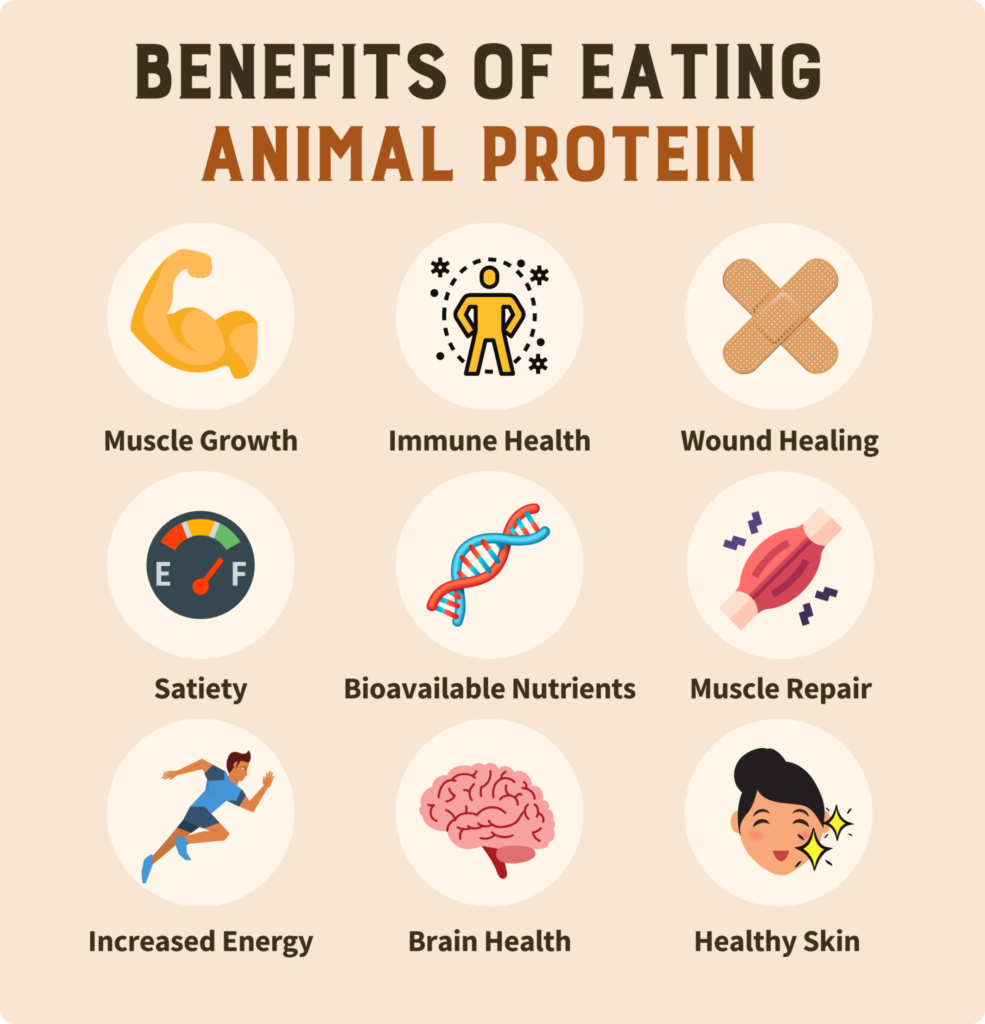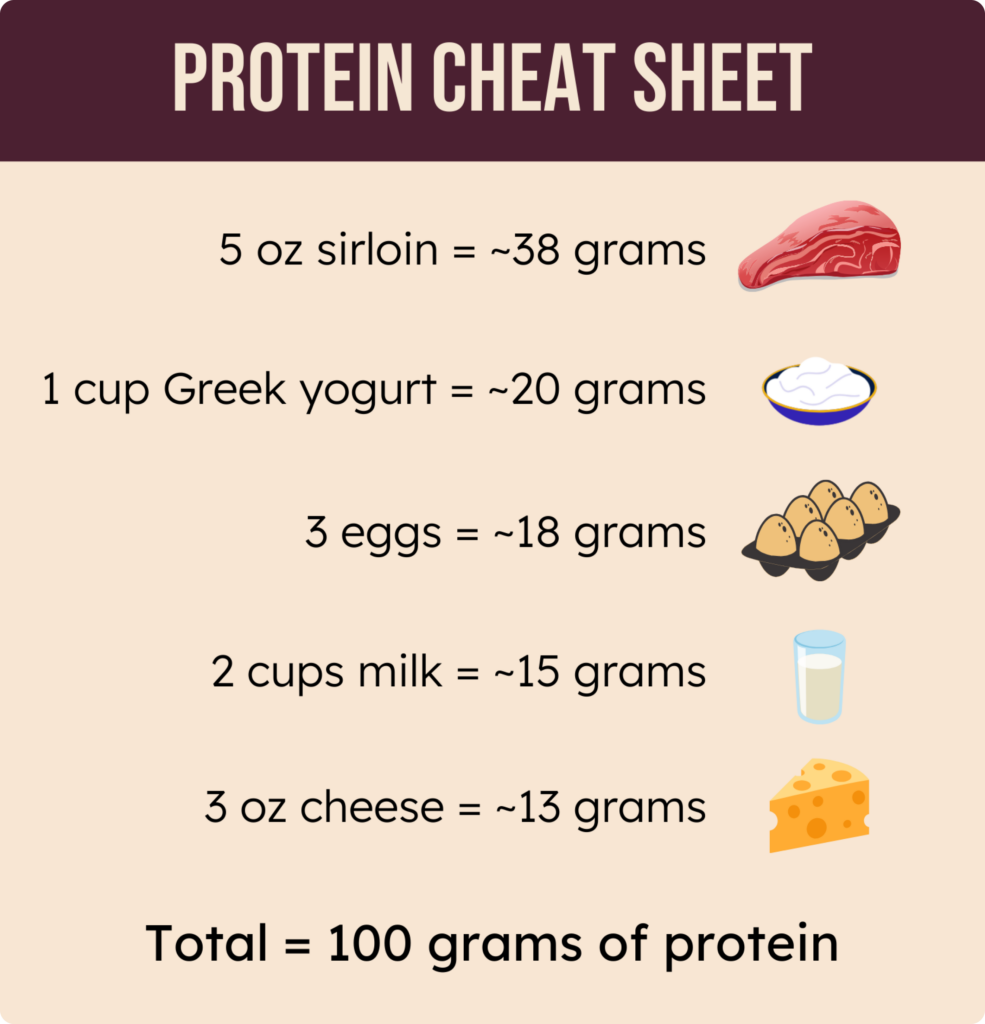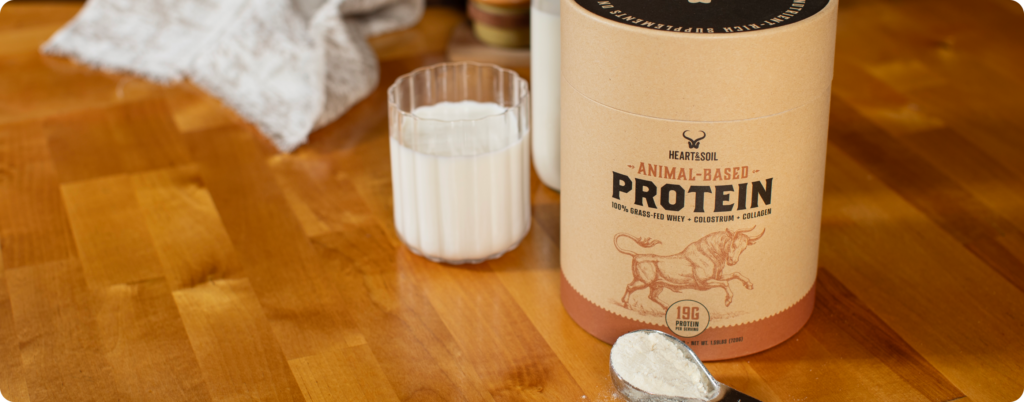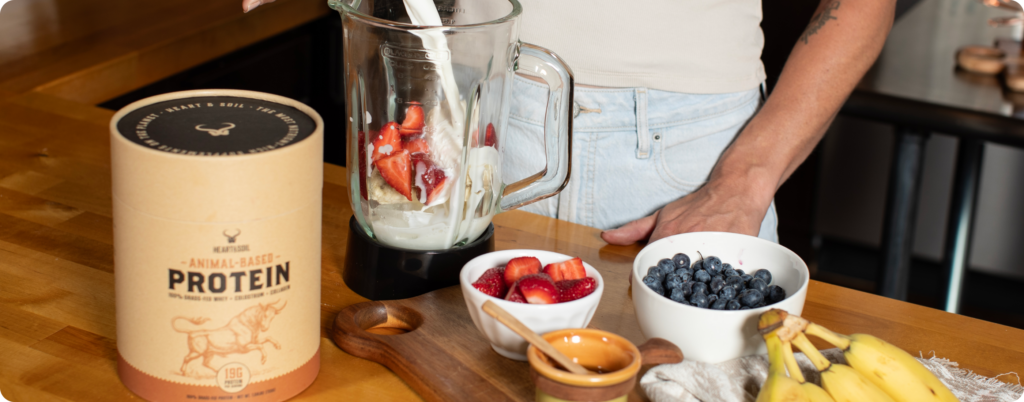Importance of Protein
Proteins, as you may remember from science class, are the building blocks of life. They’re found in every cell of the human body and are essential for building and repairing tissues, creating hormones, and supporting immune function.
However, not all sources of protein are created equal.
This blog post explores the differences between plant-based and animal-based protein powders and other sources. It also offers insights into how you can boost your protein intake to promote muscle recovery and enhance overall well-being.
Animal Protein vs Plant Protein
Plant proteins, found in legumes, nuts, seeds, and wheat gluten, differ from animal proteins sourced from meat, organs, seafood, eggs, and dairy.
We consider animal protein to be the superior source. Here’s why:
- Essential amino acids: Proteins are complex structures of amino acids. There are 20 different amino acids used by the body, and nine of them are essential amino acids, which must be obtained through diet because the body can’t produce them. Animal-based sources provide all nine essential amino acids crucial for bodily functions, which some plant-based sources lack.
- Digestibility: Animal proteins tend to be more digestible as they lack the plant defense chemicals like lectins and oxalates, and protease inhibitors found in plant sources, which can exacerbate digestive issues and inflammation.
- Bioavailability: Animal proteins offer higher bioavailability, meaning nutrients are readily absorbed and utilized by the body compared to plant proteins, which can contain antinutrients like phytic acid and tannins that hinder nutrient absorption. The structure of plant proteins is often more complex and less soluble than that of animal proteins. This can make them harder to break down in the digestive system, leading to lower absorption rates.

How Much Protein Do You Need?
The amount of protein your body needs varies based on factors such as body composition, health goals, activity level, and age. This is our general guideline:
0.8 to 1 gram of protein per pound of body weight or ideal body weight
We encourage you to experiment and set your targets to whatever makes you feel best. Chat with your doctor if you have specific questions regarding your protein intake.
Tips to Reach Your Protein Goal
A great way to effectively meet your protein macronutrient goals involves prioritizing animal-based foods in each meal. Meals that include protein, carbohydrates, and fats can help stabilize blood sugar levels, promoting overall health and sustained energy. Here’s a breakdown of approximate protein content in common animal-based foods:
- 5 oz sirloin provides around 38 grams of protein
- 1 cup of Greek yogurt offers approximately 20 grams of protein
- 3 eggs contain approximately 18 grams of protein
- 2 cups of milk provide about 15 grams of protein
- 3 oz of cheese provides approximately 13 grams or protein
For more ideas on animal-based protein sources, check out our animal-based resources.

When Should You Eat Protein?
In addition to including protein at every meal, studies have shown that consuming protein immediately after a workout, or even a few hours after, is best to optimize muscle growth and exercise recovery (1, 2).
What About Protein Powders?
Life can be chaotic! Balancing work, school, family, and gym time makes cooking protein-rich meals challenging. Protein powders offer a convenient solution.
There are a few main sources of animal-based protein powders:
- Beef isolate: Derived from beef, it offers a slower release of amino acids.
- Whey: Made from milk, whey is known for its rapid digestion and absorption due to its high concentration of branched-chain amino acids (BCAAs) like leucine. This makes it ideal for post-workout recovery and muscle-building.
There are many brands that carry protein powder, but there is one we consider to be the best animal-based protein powder.

Animal-Based Protein Powder
We recently released Animal-Based Protein (ABP), a high-quality animal-based protein powder to help you reach your daily protein goal.
One serving (2 scoops) contains:
- 2g freeze-dried trachea and scapula cartilage: to aid in joint articulation and regeneration (5, 6, 7)
The ingredients come from 100% grass-fed Australian cows that graze on green pastures year-round. These cows are raised without added hormone treatments, antibiotics, pesticides, heavy metals, and GMOs, ensuring the highest quality and ethical standards. The packaging is 100% plastic-free.
Our whey Animal-Based Protein powder stands out in a market that’s saturated with conventional whey options, and here’s why:
- Minimal Heat Exposure: ABP is never heated above 165°F. Unlike typical whey proteins that undergo high-temperature spray drying at 320-374°F, our product is flash-pasteurized only once at 161°F for 15 seconds. This ensures we meet USDA dried milk guidelines while preserving the natural integrity of proteins and essential nutrients.
- Preserved Nutrients: We use a proprietary filtration and drying method that avoids the high temperatures and extensive processing found in conventional whey. This means that our ABP retains its biologically active proteins and vital protein-bound fats, giving you a more natural and effective product to support your muscle recovery and overall well-being.
- No Unnecessary Additives: Unlike many whey proteins that undergo additional processes like hydrolyzation, and the addition of fillers like lecithin or gums, our ABP remains pure and natural. We avoid filtration methods that denature proteins and strip away essential nutrients, ensuring you get the full benefit of a complete protein source.
You can check out Animal-Based Protein HERE. Our favorite way to consume it is in an animal-based shake with banana, milk, and a touch of honey.

What’s the Verdict? Plant or Animal-Based Protein Powder
Protein is a crucial macronutrient your body needs to perform, recover, and THRIVE. Compared to plant protein, animal-based protein powder offers more essential amino acids and bioavailable nutrients while being easier to digest.
Aim to consume about one gram of protein per pound of body weight daily, with a focus on incorporating animal protein into each meal, especially post-workout. Lastly, don’t forget to check out our clean Animal-Based Protein powder to help you easily and deliciously reach your daily protein needs.
If you have any questions, feel free to reach out to a member of our Health Success Team at [email protected].
Subscribe to future articles like this: